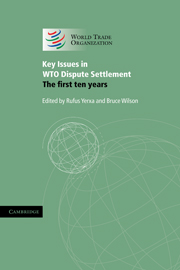Book contents
- Frontmatter
- Contents
- Notes on contributors
- Preface
- Table of cases
- Abbreviations
- PART I Introduction and General Considerations
- PART II The WTO Dispute Settlement System: Its Processes and Its Institutions
- PART III The WTO Dispute Settlement System: Systemic and Other Issues
- 12 The role of lawyers in the WTO dispute settlement system
- 13 Jurisdiction in WTO dispute settlement
- 14 Due process in WTO disputes
- 15 Standards of review in WTO panel proceedings
- 16 Administration of evidence in WTO dispute settlement proceedings
- 17 Confidentiality issues under the DSU: fact-finding process versus confidentiality
- 18 Panels' consultations with scientific experts
- 19 Amicus curiae participation in WTO dispute settlement: reflections on the past decade
- 20 Suspension of concessions and retaliation under the Agreement on Safeguards: the recent US – Steel Safeguards case
- 21 Compliance with WTO dispute settlement decisions: is there a crisis?
- 22 DSU review: a view from the inside
- PART IV Annexes
19 - Amicus curiae participation in WTO dispute settlement: reflections on the past decade
from PART III - The WTO Dispute Settlement System: Systemic and Other Issues
Published online by Cambridge University Press: 04 August 2010
- Frontmatter
- Contents
- Notes on contributors
- Preface
- Table of cases
- Abbreviations
- PART I Introduction and General Considerations
- PART II The WTO Dispute Settlement System: Its Processes and Its Institutions
- PART III The WTO Dispute Settlement System: Systemic and Other Issues
- 12 The role of lawyers in the WTO dispute settlement system
- 13 Jurisdiction in WTO dispute settlement
- 14 Due process in WTO disputes
- 15 Standards of review in WTO panel proceedings
- 16 Administration of evidence in WTO dispute settlement proceedings
- 17 Confidentiality issues under the DSU: fact-finding process versus confidentiality
- 18 Panels' consultations with scientific experts
- 19 Amicus curiae participation in WTO dispute settlement: reflections on the past decade
- 20 Suspension of concessions and retaliation under the Agreement on Safeguards: the recent US – Steel Safeguards case
- 21 Compliance with WTO dispute settlement decisions: is there a crisis?
- 22 DSU review: a view from the inside
- PART IV Annexes
Summary
Introduction
The advent of the WTO has triggered countless debates regarding sovereignty. The process of conforming domestic laws for the purpose of WTO accession and the obligation to comply with a dispute panel or Appellate Body decision have both fuelled fears that an international organization such as the WTO compromises Members' domestic authority and international sovereignty. Amicus curiae participation in WTO disputes has been evolving against this context. Amicus curiae participation has been described by critics as inappropriately elevating the status of private actors – no matter how big or small – to that of a government. In contrast, proponents of amicus curiae participation argue that transparency and participation will strengthen public support for the WTO, and thus ultimately strengthen the institution.
As we review this issue at the tenth anniversary of the WTO, the jurisprudence and experience to date should silence the initial fears. The nightmare scenarios simply have not become reality. Like other international tribunals, WTO dispute panels and the Appellate Body have displayed active restraint in accepting and considering amicus curiae briefs. The WTO adjudicative bodies have respected the pre-eminence of the WTO Members themselves, quieting the fear that the sovereignty and interests of each Member will be hijacked by the views of private actors through the medium of amicus briefs.
- Type
- Chapter
- Information
- Key Issues in WTO Dispute SettlementThe First Ten Years, pp. 221 - 231Publisher: Cambridge University PressPrint publication year: 2005
- 3
- Cited by



